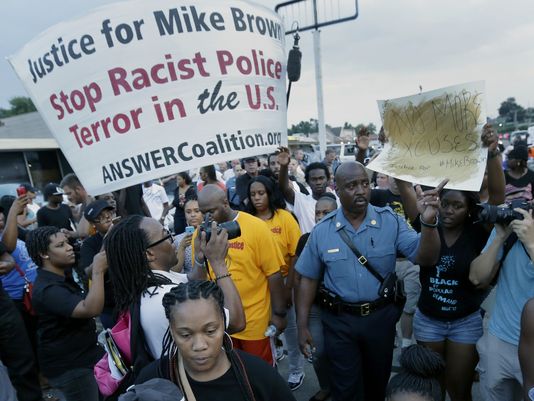From Ferguson to Umoja

September 10, 2014
While NDP students were enjoying their summer break, many heading to Ocean City or Bethany while others met up with friends to enjoy a Starbucks run or a mall meet up, the town of Ferguson, Missouri was living a starkly different reality. If you were to turn on CNN or any other news station in mid to late August, you were sure to be assaulted with startling images from that town. Riots, tear gas, and police action against protestors made this formerly mundane American town look much more like an image from Ukraine or the Middle East. The cause of these riots is sparking debate across the whole country. The facts are murky and confused, but what we do know is this: a young and unarmed boy named Michael Brown was shot by a police officer. He held his hands up to show that he meant no harm to the officer, Darren Wilson and was then shot. Recent autopsies confirm that Brown was shot a total of six times.
The question is obvious. What made Wilson shoot? Police officers are supposed to keep us safe and guard us against violence, so why then was an 18 year old boy shot and killed by one such agent of justice? Many are pointing to one fact. Michael was African American. Believing Brown did not provoke the officer in any way, many have drawn the conclusion that Brown was not shot because of the content of his character but because of the color of his skin.
Ferguson is the most recent in a series of similar and startling cases. It should be noted that though widespread anger has been caused by these stories, it cannot be conclusively proven that racism is at their heart. This being said, many feel it is. In Florida in 2012, Trayvon Martin, also a young African American, was killed by a police officer in his hometown. It seems clear that these are only two examples of an American society which, though it has grown steadily more diverse over the past decades, has continued to discriminate in new and disturbing ways. Racism has not disappeared but has instead become sneakier. The effects, however, are in no way hidden. Perhaps it is a subconscious fear of stereotypes inherited from years of hatred. Or perhaps it is an effect of a society which dooms some of its citizens from the start with unequal wealth distribution and school systems. Still, the fact remains that an overwhelming majority of our prison cells are filled by African American men.
As the debate rages across the country, there is one point that often gets omitted. Michael Brown is not a mere symbol of a problem, an example to bolster preexisting arguments, or a catalyst for yet another fight. He is a person first and foremost. He has a family, and he has friends who are now left to mourn as the rest of the country rages. In a letter to Michael’s mother, Sybrina Fulton, mother of Trayvon Martin, writes, “Our children are our future so whenever any of our children – black, white, brown, yellow, or red – are taken from us unnecessarily, it causes a never-ending pain that is unlike anything I could have imagined experiencing.” Later in the letter, Fulton says of their sons, “neither of their lives shall be in vain. The galvanizations of our communities must be continued beyond the tragedies.”
It often feels as if Ferguson might as well be on a whole different planet from our own. We fail to realize that violence and hatred are not cancers growing in isolated pockets of humanity but are pervasive throughout the whole human race. Thus, they are ours to deal with. I have never come across a community more dedicated to justice, peace, and the spreading of love than ours at NDP. We band together as sisters, with Umoja, RYP, trips around the world to spread justice, and the random kindness, acceptance, and equality we show each other every day. If all of America were as grounded in truth and loyalty as Notre Dame, the world would be a better place. We stress every day that we are sisters, and we know that all sisters are equally loved and deserving of justice. And if we want the rest of the world to begin seeing itself the same way we see each other here, we have a lot of work to do. The good news? We are already doing it. With our great service opportunities that help the needy near and far, men and women, sloths and children, black and white. And I have faith we will continue this year as we always do with our new theme of Umoja which, I think, pretty much sums up this article. Unity. If we want racism to end, we must fight division not with anger but with Umoja.
Fulton, Sybrina. “Trayvon Martin’s Mom: ‘If They Refuse to Hear Us, We
Will Make Them Feel Us’.” Time. N.p., 18 Aug. 2014. Web. 10 Sept. 2014.
<http://time.com/3136685/travyon-sybrina-fulton-ferguson/>.
“Timeline: Michael Brown shooting in Ferguson, MO.” USA Today. N.p., 25 Aug.
2014. Web. 10 Sept. 2014. <http://www.usatoday.com/story/news/nation/
2014/08/14/michael-brown-ferguson-missouri-timeline/14051827/>.
Alcindor, Yamiche. “Mo. gov. declares state of emergency, curfew in Ferguson.”
USA Today. N.p., 19 Aug. 2014. Web. 10 Sept. 2014.
<http://www.usatoday.com/story/news/nation/2014/08/16/
ferguson-missouri-michael-brown-rally-protests/14160469/>.
